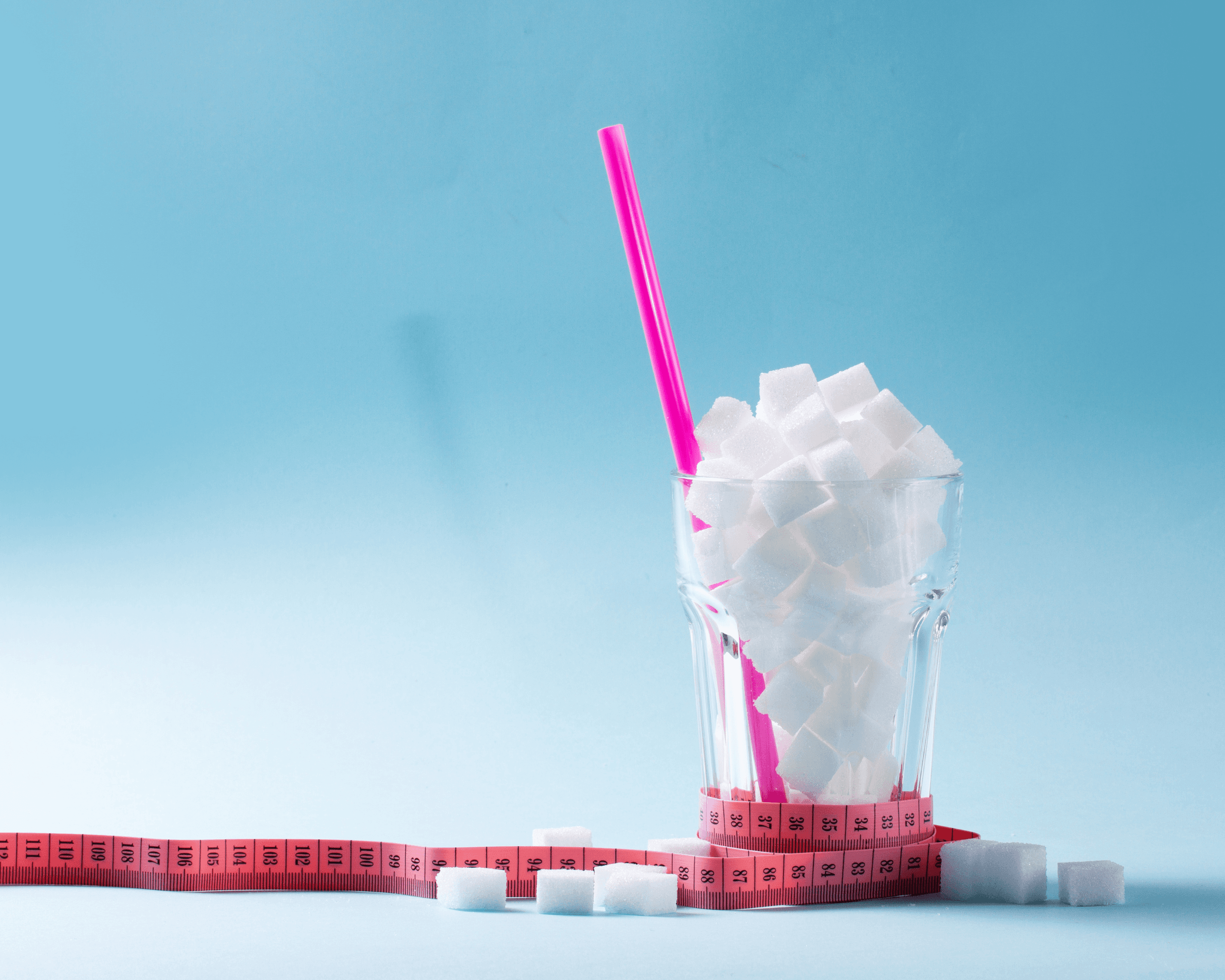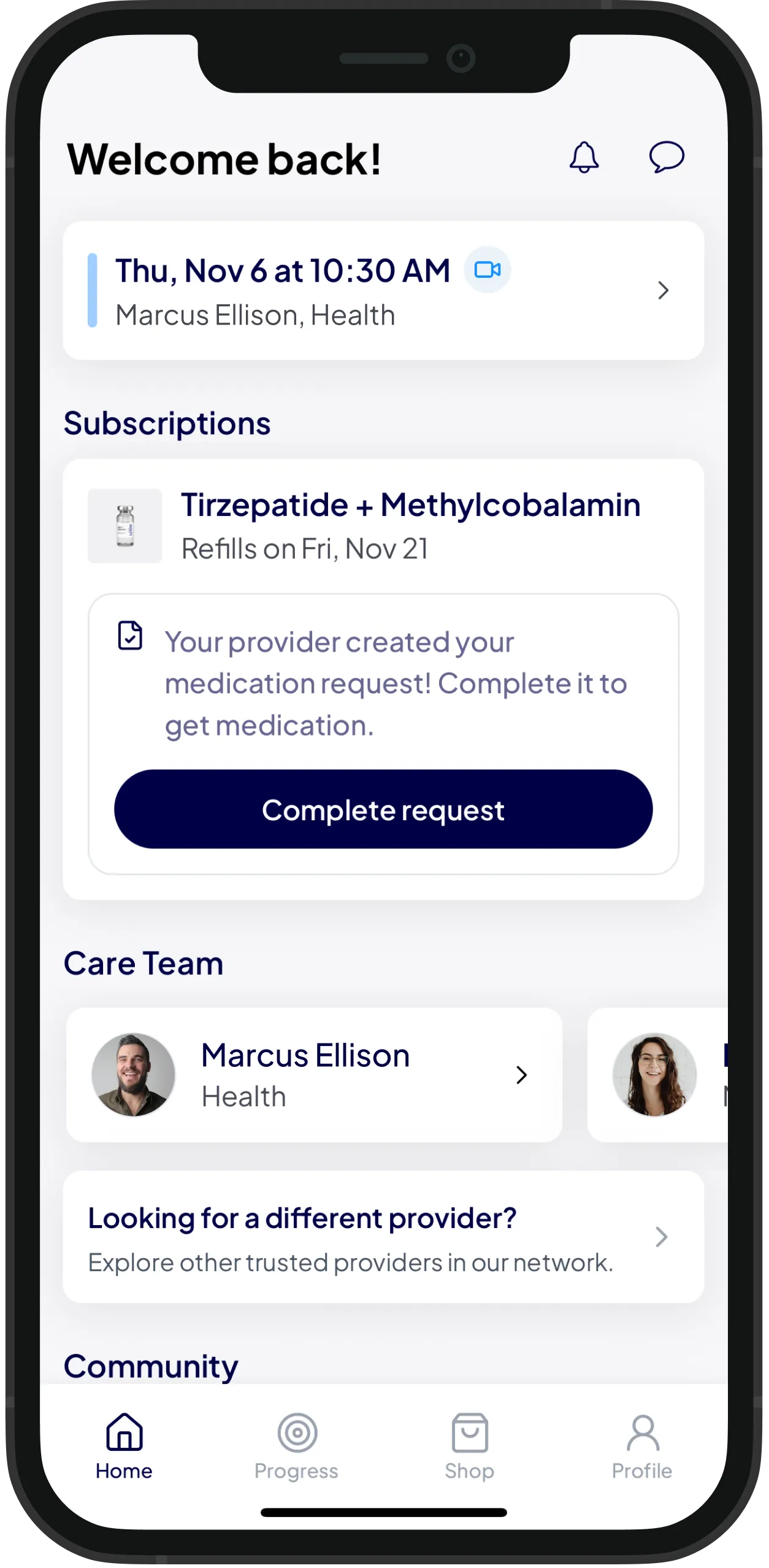Ready to transform your health?
Unlock access to expert guidance and a weight care plan crafted just for you.
Similar Articles
Similar Articles

GLP-1s for Athletes: Performance, Body Composition, and Recovery
GLP-1s for Athletes: Performance, Body Composition, and Recovery

What Labs Should You Monitor on GLP-1s? A Complete Biomarker Guide
What Labs Should You Monitor on GLP-1s? A Complete Biomarker Guide

Does Semaglutide Affect Fertility or Pregnancy?
Does Semaglutide Affect Fertility or Pregnancy?
Why Protein Intake Matters on GLP-1 Medications and How Much You Really Need
Learn why protein is essential when using GLP 1 medications like semaglutide and tirzepatide. Understand how protein supports muscle, metabolism, fullness, and long term weight stability. Includes research, FAQs, and guidance.

Table of Contents
Table of Contents
Why Protein Intake Matters on GLP-1 Medications
The Relationship Between GLP-1 Medications and Appetite
Why Protein Becomes Even More Important On GLP-1s
How Much Protein You Really Need
How Protein Helps Reduce Common GLP-1 Side Effects
How Protein Supports Long Term Weight Maintenance
Making Protein Easier While on GLP-1s
FAQs
References
Why Protein Intake Matters on GLP-1 Medications
The Relationship Between GLP-1 Medications and Appetite
Why Protein Becomes Even More Important On GLP-1s
How Much Protein You Really Need
How Protein Helps Reduce Common GLP-1 Side Effects
How Protein Supports Long Term Weight Maintenance
Making Protein Easier While on GLP-1s
FAQs
References
Why Protein Intake Matters on GLP 1 Medications
GLP 1 medications such as semaglutide and tirzepatide have shifted the way many people approach weight loss. These treatments reduce appetite, quiet persistent food noise, and help individuals naturally eat less without relying on willpower alone. However, this decrease in appetite brings a lesser discussed challenge. Many people unintentionally eat too little protein. Since protein plays a central role in metabolism, muscle preservation, and long term weight stability, understanding its importance becomes essential when using GLP 1 medication.
If you are considering GLP 1 treatment or want to explore whether Mochi Health is a fit for your needs, you can start by checking your eligibility here:
Check your eligibility
The Relationship Between GLP 1 Medications and Appetite
GLP 1 medications work by mimicking a natural hormone that influences satiety, blood sugar regulation, and the speed at which your stomach empties. Once these pathways are activated, people feel full sooner and stay full longer. This makes it easier to reduce daily calorie intake, which leads to significant weight loss over time.
But because appetite drops, people often begin eating fewer calories than before. When calories go down, protein intake frequently follows. Many patients report feeling satisfied with very small meals, sometimes too small to contain adequate protein. Over time, this imbalance can affect how the body responds to weight loss.
Why Protein Becomes Even More Important On GLP 1s
Protein is one of the most important nutrients to pay attention to when you are taking a GLP 1 like semaglutide or tirzepatide. These medications naturally lower your appetite. When you feel full quickly, it becomes very easy to eat much less food overall. While this is part of what makes GLP 1s so effective, it also means your body receives fewer building blocks to maintain muscle.
This matters more than many people realize. Muscle does not just affect strength. It is deeply connected to metabolism, energy, mobility, hormone balance, blood sugar stability, and long term weight maintenance. The scientific literature consistently shows that people who preserve lean mass during weight loss maintain a faster metabolic rate and are far less likely to regain weight later.
One of the strongest examples comes from a randomized controlled trial published in Obesity by Smith and colleagues (2016). The study compared weight loss in two groups eating the same number of calories. One group ate a high protein diet and the other ate a standard protein diet. Both groups lost weight, but the difference in what they lost was striking. The high protein group lost almost entirely fat, while the standard protein group lost a mix of fat and muscle.

This pattern appears across many controlled trials. In a 2021 randomized study published in The American Journal of Clinical Nutrition, Hoertel and colleagues found that individuals consuming higher protein preserved nearly twice as much lean mass during calorie restriction compared with those who consumed lower protein.
When appetite drops sharply, the body sometimes pulls amino acids from muscle to fill the gap. Over time, this can lead to lower strength, slower metabolism, fatigue, and a greater chance of weight regain once medication doses level out or decrease. It can also affect skin, nails, and hair, because protein supports collagen, keratin, and normal tissue repair.
GLP 1 users are more vulnerable to this because they often eat smaller meals and skip snacks unintentionally. Protein becomes concentrated into fewer eating opportunities, so every meal counts.
How Much Protein You Really Need
Because GLP 1 medications reduce hunger, protein needs do not change, but the window for consuming becomes smaller. Most clinical nutrition guidelines recommend aiming for roughly 1.2 to 1.6 grams of protein per kilogram of goal body weight, which translates to around 0.6 to 0.75 grams per pound. Some experts recommend up to 1 gram per pound of goal weight for people who want to preserve or rebuild lean mass.
For a person whose goal weight is 150 pounds, this usually means 90 to 150 grams of protein per day. While this may sound high, these numbers come from controlled clinical studies showing that these intake levels help prevent muscle breakdown during weight loss. A widely cited example is a 2015 metabolic ward study by Longland and colleagues, where overweight adults placed on a calorie deficit preserved far more muscle when they consumed about 1 gram of protein per pound compared with those eating lower amounts.
The take home message is that when you are eating less food, you must be more deliberate about including protein. Otherwise, your body will take the protein it needs from muscle instead of your diet.
How Protein Helps Reduce Common GLP 1 Side Effects
Eating enough protein can also help reduce some of the most common side effects of GLP 1 medications. Protein slows digestion naturally, which improves how the stomach empties. When you combine that with the slowed gastric emptying caused by GLP 1s, meals that contain enough protein tend to feel gentler on the stomach compared with meals that are mostly simple carbs.
Protein also steadies blood sugar, which can help prevent nausea that comes from sugar fluctuations. Many patients notice they feel less shaky, less lightheaded, and more stable throughout the day when they begin prioritizing protein. This happens because protein triggers the release of glucagon and incretin hormones that smooth out blood sugar changes.
Another benefit is hair and skin health. When calorie intake drops, your body prioritizes essential organs over non essential structures like hair follicles. Low protein intake can exaggerate this effect. Adequate protein supports collagen production and keratin formation, which may help reduce shedding and support healthier skin during weight loss.
How Protein Supports Long Term Weight Maintenance
One of the biggest predictors of long term weight maintenance is how much muscle you keep during weight loss. This is true regardless of whether someone is using medication or not. Muscle tissue burns more calories at rest than fat tissue, so people who maintain more muscle generally maintain a higher metabolic rate. A higher metabolic rate makes it easier to keep weight off once you reach your goal.
A clinical trial published in Obesity Reviews in 2018 showed that people who consumed more protein and did even minimal strength training regained significantly less weight over three years than those who did not.
This is directly relevant for anyone on GLP 1 medications. Even if medications reduce appetite naturally, the body still benefits from a diet that supports lean mass. Strength training, even one to two times per week, compounds this effect by signaling the body to hold onto muscle.
If you want structured support for nutrition, movement, and medication, you can start by checking your eligibility here.
Making Protein Easier While on GLP 1s
Since appetite tends to decrease on GLP 1s, the key is choosing foods that give you a lot of protein in small portions. This includes Greek yogurt, cottage cheese, eggs, tofu, beans, fish, chicken, and protein shakes. For people who feel too full to eat larger meals, protein shakes can be a practical solution because they allow you to consume 20 to 40 grams without feeling overly stuffed.
FAQs
Why do people need more protein on GLP 1s
People naturally eat less on GLP 1 medications, and appetite drops significantly. When calorie intake falls, protein intake often falls with it. Higher protein supports muscle preservation, metabolism, and long term health.
What happens if someone does not eat enough protein
Low protein intake increases the risk of losing muscle during weight loss. This can lead to fatigue, slower metabolism, and less sustainable weight maintenance.
Can you eat too much protein
Most people tolerate higher protein diets well. If someone has kidney issues or a medical condition affecting protein metabolism, a clinician should guide intake.
Do protein shakes count as real protein
Yes. High quality protein shakes are an effective way to increase protein intake when appetite is low. Many patients use shakes daily for convenience.
How do I know if I am eating enough
A good sign is whether you feel full, strong, and stable throughout the day. Tracking protein intake for a week can also help illuminate gaps. Mochi clinicians can guide you based on your goals.
Check Your Eligibility
If you are interested in GLP 1 treatment or want to learn whether compounded semaglutide is an option for you, you can start by completing Mochi’s simple eligibility questionnaire. It only takes a few minutes and helps our clinical team understand your goals, medical history, and the safest path forward. Every patient receives personalized guidance, clear information about medication options, and support throughout their care. You can begin your eligibility check today and take the first step toward consistent, accessible, and dependable obesity treatment with Mochi. Check your eligibility
References
Hoertel, H. A., Willingham, B., Kephart, W., Mobley, C. B., Fox, C. D., Holland, A. M., Mumford, P. W., Young, K. C., Osburn, S. C., Patel, R. K., Martin, J. S., Lockwood, C., Muddle, T. W., and Roberts, M. D. (2021). Dose response effects of dietary protein on muscle mass preservation during weight loss. The American Journal of Clinical Nutrition, 113(6), 1471 to 1485.
Longland, T. M., Oikawa, S. Y., Mitchell, C. J., Devries, M. C., and Phillips, S. M. (2016). Higher compared with lower dietary protein during an energy deficit combined with intense exercise promotes greater lean mass gain and fat mass loss. The American Journal of Clinical Nutrition, 103(3), 738 to 746.
Smith, G. I., Yoshino, J., Kelly, S. C., Reeds, D. N., Okunade, A., Patterson, B. W., Mittendorfer, B. (2016). High protein intake during weight loss therapy eliminates the weight loss induced improvement in insulin sensitivity. Obesity, 24(2), 448 to 455.
Verreijen, A. M., Engberink, M. F., Houston, D. K., Brouwer, I. A., and Visser, M. (2017). High protein diet and physical exercise reduce muscle loss in overweight older adults during weight loss. Nutrition Journal, 16(1), 1 to 10.
Wycherley, T. P., Moran, L. J., Clifton, P. M., Noakes, M., and Brinkworth, G. D. (2012). Effects of energy restricted high protein diets on body composition and metabolic outcomes. The American Journal of Clinical Nutrition, 96(6), 1281 to 1298.
USDA FoodData Central (2024). Protein content of common foods.
Paddon-Jones, D., Westman, E., Mattes, R. D., Wolfe, R. R., Astrup, A., and Westerterp-Plantenga, M. (2008). Protein, weight management, and satiety. The American Journal of Clinical Nutrition, 87(5), 1558S to 1561S.
Why Protein Intake Matters on GLP 1 Medications
GLP 1 medications such as semaglutide and tirzepatide have shifted the way many people approach weight loss. These treatments reduce appetite, quiet persistent food noise, and help individuals naturally eat less without relying on willpower alone. However, this decrease in appetite brings a lesser discussed challenge. Many people unintentionally eat too little protein. Since protein plays a central role in metabolism, muscle preservation, and long term weight stability, understanding its importance becomes essential when using GLP 1 medication.
If you are considering GLP 1 treatment or want to explore whether Mochi Health is a fit for your needs, you can start by checking your eligibility here:
Check your eligibility
The Relationship Between GLP 1 Medications and Appetite
GLP 1 medications work by mimicking a natural hormone that influences satiety, blood sugar regulation, and the speed at which your stomach empties. Once these pathways are activated, people feel full sooner and stay full longer. This makes it easier to reduce daily calorie intake, which leads to significant weight loss over time.
But because appetite drops, people often begin eating fewer calories than before. When calories go down, protein intake frequently follows. Many patients report feeling satisfied with very small meals, sometimes too small to contain adequate protein. Over time, this imbalance can affect how the body responds to weight loss.
Why Protein Becomes Even More Important On GLP 1s
Protein is one of the most important nutrients to pay attention to when you are taking a GLP 1 like semaglutide or tirzepatide. These medications naturally lower your appetite. When you feel full quickly, it becomes very easy to eat much less food overall. While this is part of what makes GLP 1s so effective, it also means your body receives fewer building blocks to maintain muscle.
This matters more than many people realize. Muscle does not just affect strength. It is deeply connected to metabolism, energy, mobility, hormone balance, blood sugar stability, and long term weight maintenance. The scientific literature consistently shows that people who preserve lean mass during weight loss maintain a faster metabolic rate and are far less likely to regain weight later.
One of the strongest examples comes from a randomized controlled trial published in Obesity by Smith and colleagues (2016). The study compared weight loss in two groups eating the same number of calories. One group ate a high protein diet and the other ate a standard protein diet. Both groups lost weight, but the difference in what they lost was striking. The high protein group lost almost entirely fat, while the standard protein group lost a mix of fat and muscle.

This pattern appears across many controlled trials. In a 2021 randomized study published in The American Journal of Clinical Nutrition, Hoertel and colleagues found that individuals consuming higher protein preserved nearly twice as much lean mass during calorie restriction compared with those who consumed lower protein.
When appetite drops sharply, the body sometimes pulls amino acids from muscle to fill the gap. Over time, this can lead to lower strength, slower metabolism, fatigue, and a greater chance of weight regain once medication doses level out or decrease. It can also affect skin, nails, and hair, because protein supports collagen, keratin, and normal tissue repair.
GLP 1 users are more vulnerable to this because they often eat smaller meals and skip snacks unintentionally. Protein becomes concentrated into fewer eating opportunities, so every meal counts.
How Much Protein You Really Need
Because GLP 1 medications reduce hunger, protein needs do not change, but the window for consuming becomes smaller. Most clinical nutrition guidelines recommend aiming for roughly 1.2 to 1.6 grams of protein per kilogram of goal body weight, which translates to around 0.6 to 0.75 grams per pound. Some experts recommend up to 1 gram per pound of goal weight for people who want to preserve or rebuild lean mass.
For a person whose goal weight is 150 pounds, this usually means 90 to 150 grams of protein per day. While this may sound high, these numbers come from controlled clinical studies showing that these intake levels help prevent muscle breakdown during weight loss. A widely cited example is a 2015 metabolic ward study by Longland and colleagues, where overweight adults placed on a calorie deficit preserved far more muscle when they consumed about 1 gram of protein per pound compared with those eating lower amounts.
The take home message is that when you are eating less food, you must be more deliberate about including protein. Otherwise, your body will take the protein it needs from muscle instead of your diet.
How Protein Helps Reduce Common GLP 1 Side Effects
Eating enough protein can also help reduce some of the most common side effects of GLP 1 medications. Protein slows digestion naturally, which improves how the stomach empties. When you combine that with the slowed gastric emptying caused by GLP 1s, meals that contain enough protein tend to feel gentler on the stomach compared with meals that are mostly simple carbs.
Protein also steadies blood sugar, which can help prevent nausea that comes from sugar fluctuations. Many patients notice they feel less shaky, less lightheaded, and more stable throughout the day when they begin prioritizing protein. This happens because protein triggers the release of glucagon and incretin hormones that smooth out blood sugar changes.
Another benefit is hair and skin health. When calorie intake drops, your body prioritizes essential organs over non essential structures like hair follicles. Low protein intake can exaggerate this effect. Adequate protein supports collagen production and keratin formation, which may help reduce shedding and support healthier skin during weight loss.
How Protein Supports Long Term Weight Maintenance
One of the biggest predictors of long term weight maintenance is how much muscle you keep during weight loss. This is true regardless of whether someone is using medication or not. Muscle tissue burns more calories at rest than fat tissue, so people who maintain more muscle generally maintain a higher metabolic rate. A higher metabolic rate makes it easier to keep weight off once you reach your goal.
A clinical trial published in Obesity Reviews in 2018 showed that people who consumed more protein and did even minimal strength training regained significantly less weight over three years than those who did not.
This is directly relevant for anyone on GLP 1 medications. Even if medications reduce appetite naturally, the body still benefits from a diet that supports lean mass. Strength training, even one to two times per week, compounds this effect by signaling the body to hold onto muscle.
If you want structured support for nutrition, movement, and medication, you can start by checking your eligibility here.
Making Protein Easier While on GLP 1s
Since appetite tends to decrease on GLP 1s, the key is choosing foods that give you a lot of protein in small portions. This includes Greek yogurt, cottage cheese, eggs, tofu, beans, fish, chicken, and protein shakes. For people who feel too full to eat larger meals, protein shakes can be a practical solution because they allow you to consume 20 to 40 grams without feeling overly stuffed.
FAQs
Why do people need more protein on GLP 1s
People naturally eat less on GLP 1 medications, and appetite drops significantly. When calorie intake falls, protein intake often falls with it. Higher protein supports muscle preservation, metabolism, and long term health.
What happens if someone does not eat enough protein
Low protein intake increases the risk of losing muscle during weight loss. This can lead to fatigue, slower metabolism, and less sustainable weight maintenance.
Can you eat too much protein
Most people tolerate higher protein diets well. If someone has kidney issues or a medical condition affecting protein metabolism, a clinician should guide intake.
Do protein shakes count as real protein
Yes. High quality protein shakes are an effective way to increase protein intake when appetite is low. Many patients use shakes daily for convenience.
How do I know if I am eating enough
A good sign is whether you feel full, strong, and stable throughout the day. Tracking protein intake for a week can also help illuminate gaps. Mochi clinicians can guide you based on your goals.
Check Your Eligibility
If you are interested in GLP 1 treatment or want to learn whether compounded semaglutide is an option for you, you can start by completing Mochi’s simple eligibility questionnaire. It only takes a few minutes and helps our clinical team understand your goals, medical history, and the safest path forward. Every patient receives personalized guidance, clear information about medication options, and support throughout their care. You can begin your eligibility check today and take the first step toward consistent, accessible, and dependable obesity treatment with Mochi. Check your eligibility
References
Hoertel, H. A., Willingham, B., Kephart, W., Mobley, C. B., Fox, C. D., Holland, A. M., Mumford, P. W., Young, K. C., Osburn, S. C., Patel, R. K., Martin, J. S., Lockwood, C., Muddle, T. W., and Roberts, M. D. (2021). Dose response effects of dietary protein on muscle mass preservation during weight loss. The American Journal of Clinical Nutrition, 113(6), 1471 to 1485.
Longland, T. M., Oikawa, S. Y., Mitchell, C. J., Devries, M. C., and Phillips, S. M. (2016). Higher compared with lower dietary protein during an energy deficit combined with intense exercise promotes greater lean mass gain and fat mass loss. The American Journal of Clinical Nutrition, 103(3), 738 to 746.
Smith, G. I., Yoshino, J., Kelly, S. C., Reeds, D. N., Okunade, A., Patterson, B. W., Mittendorfer, B. (2016). High protein intake during weight loss therapy eliminates the weight loss induced improvement in insulin sensitivity. Obesity, 24(2), 448 to 455.
Verreijen, A. M., Engberink, M. F., Houston, D. K., Brouwer, I. A., and Visser, M. (2017). High protein diet and physical exercise reduce muscle loss in overweight older adults during weight loss. Nutrition Journal, 16(1), 1 to 10.
Wycherley, T. P., Moran, L. J., Clifton, P. M., Noakes, M., and Brinkworth, G. D. (2012). Effects of energy restricted high protein diets on body composition and metabolic outcomes. The American Journal of Clinical Nutrition, 96(6), 1281 to 1298.
USDA FoodData Central (2024). Protein content of common foods.
Paddon-Jones, D., Westman, E., Mattes, R. D., Wolfe, R. R., Astrup, A., and Westerterp-Plantenga, M. (2008). Protein, weight management, and satiety. The American Journal of Clinical Nutrition, 87(5), 1558S to 1561S.
Read next
Ready to transform your health?
Unlock access to expert guidance and a weight care plan crafted just for you.

Ready to transform your health?
Unlock access to expert guidance and a weight care plan crafted just for you.

Ready to transform your health?
Unlock access to expert guidance and a weight care plan crafted just for you.


© 2026 Mochi Health
All professional medical services are provided by licensed physicians and clinicians affiliated with independently owned and operated professional practices. Mochi Health Corp. provides administrative and technology services to affiliated medical practices it supports, and does not provide any professional medical services itself.


© 2026 Mochi Health
All professional medical services are provided by licensed physicians and clinicians affiliated with independently owned and operated professional practices. Mochi Health Corp. provides administrative and technology services to affiliated medical practices it supports, and does not provide any professional medical services itself.


© 2026 Mochi Health
All professional medical services are provided by licensed physicians and clinicians affiliated with independently owned and operated professional practices. Mochi Health Corp. provides administrative and technology services to affiliated medical practices it supports, and does not provide any professional medical services itself.
















